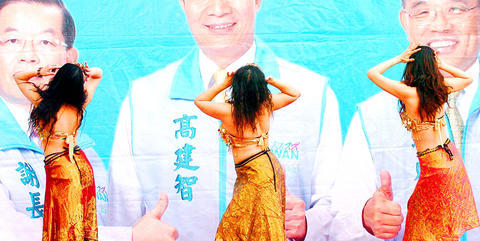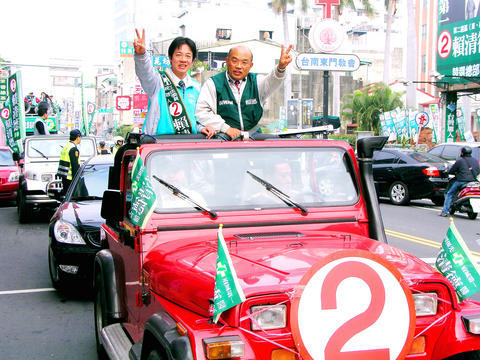With the legislative election battle reaching boiling point with less than a week to go, Democratic Progressive Party (DPP) and Chinese Nationalist Party (KMT) "big guns" engaged in non-stop campaigning around the country yesterday to stump for their prospective legislative candidates.
President Chen Shui-bian (陳水扁), who doubles as DPP chairman, was shaking hands and working the crowd in Taoyuan, Taichung and Miaoli yesterday morning. He then showed up at campaign rallies in Chunghua in the evening.
Other pan-green heavyweights such as DPP presidential candidate Frank Hsieh (謝長廷), his running mate Su Tseng-chang (蘇貞昌) and Vice President Annette Lu (呂秀蓮) also criss-crossed the nation stumping for their party's legislative hopefuls.

PHOTO: CHANG CHIA-MING, TAIPEI TIMES
The pan-blue camp's big guns also spent the last Sunday before the legislative poll on Saturday gearing up support for the KMT's legislative candidates.
Former KMT chairman Lien Chan (連戰), who had not made many public appearances recently, has been on a tight campaign schedule for the past few days. He campaigned yesterday for five candidates in Pingtung and Kaohsiung, constituencies which are considered DPP strongholds.
KMT presidential candidate Ma Ying-jeou (

PHOTO: HUANG PO-LANG, TAIPEI TIMES
Later yesterday, Ma was at a campaign rally in Kaohsiung County while KMT Chairman Wu Poh-hsiung (吳伯雄) was campaigning for a KMT candidate in Chiayi.
Ma said candidates from all around the nation had urged him to campaign for them ahead of the election.
KMT legislative caucus leader Kuo Su-chun (郭素春), an at-large candidate in this year's race, has been attending rallies around the country for fellow KMT candidates and said appearances by Ma have been an asset to their campaigns.
While candidates could judge for themselves how many votes the big names would be worth in their constituencies, Kuo said that from her experience "most KMT candidates believe the charismatic Ma appeals to the voters and they want to capitalize on it."
Lin Tsang-min (林滄敏), an incumbent KMT lawmaker locked in a tight battle in Changhua County, was one of those hoping to benefit from Ma's presence.
He said he has found that his campaign gets a real boost when Ma arrives in the county and stumps on his behalf.
Leveraging support from "Mr or Ms Popular" is becoming one of the most favored campaign tactics in this election. The "populars" are the political stars seen to be capable of livening up campaign platform presentations, fueling election battles and adding votes for the candidates they support.
For the pan-green camp, Government Information Office Minister Shieh Jhy-wey (謝志偉) is considered the most effective "Mr Popular."
DPP Legislator Chuang Suo-hang (
Chuang's comments were echoed by DPP Legislator Sandy Yen (
Other pan-green "populars" include Hsieh, Su and former vice premier Tsai Ing-wen (
Among them, Hsieh's quick wit and humor is quite popular with the candidates, making him the runner-up behind Shieh, Chuang said. President Chen and Kaohsiung Mayor Chen Chu (陳菊) are also popular star campaigners for their high fame and strong speeches, Chuang added.
DPP Legislator Tsai Chi-chang (
But not all candidates favored the political stars as their campaign stumpers.
DPP Legislator Huang Chao-hui (
Three years ago, when Huang ran for legislator, Chen Ling-li promised voters she would devote her full attention to helping her husband and give up her seat on the council should Huang be elected, Huang said.
To this day, Chen Ling-li's grassroots work with the voters during her term as councilor still offers Huang tremendous help, for which he is extremely grateful, he said.
KMT Legislator Shyu Jong-shyoung (徐中雄), who is seeking re-election in Taichung County, also said that he did not need the help of a star campaigner. Of course, he may feel a little less pressure -- the DPP failed to nominate anybody to oppose him.
One KMT candidate, who asked to remain anonymous, said he did not want party heavyweights campaigning by his side because they would manipulate partisan divisions and emphasize the "pan-green" versus "pan-blue" divide.
There were also mixed feelings in the pan-green camp toward having the big names appear on stage.
Under the old system of multi-representative districts, appealing to one's core support base was sufficient to win a seat. In this year's legislative polls, however, candidates are generally engaged in two-horse races where independent voters could decide their fates. They were voters who were likely to be less impressed by the endorsement of party heavyweights engaging in partisan rhetoric.
DPP candidate Huang Wei-cher (黃偉哲), in a tight race against incumbent Non-Partisan Solidarity Union candidate Lee He-shun (李和順) in Tainan County, felt that with the DPP's historical strength in southern Taiwan, President Chen and other party heavyweights should attend more rallies there in order to energize the DPP's core support base.
Huang said he did not worry that the president's speeches might drive away centrist voters because he had plenty of campaigning experience and knew what he should or should not say.
On the other hand, incumbent DPP lawmaker Chiu Chuang-chin (
Chiu said star campaigners were useful in boosting a campaign team's morale, intimidating opponents and giving voters the impression that the candidate had a wide range of supporters, but that they do not necessarily win more votes.
Additional reporting by Ko Shu-ling and Flora Wang

INVESTIGATION: The case is the latest instance of a DPP figure being implicated in an espionage network accused of allegedly leaking information to Chinese intelligence Democratic Progressive Party (DPP) member Ho Jen-chieh (何仁傑) was detained and held incommunicado yesterday on suspicion of spying for China during his tenure as assistant to then-minister of foreign affairs Joseph Wu (吳釗燮). The Taipei District Prosecutors’ Office said Ho was implicated during its investigation into alleged spying activities by former Presidential Office consultant Wu Shang-yu (吳尚雨). Prosecutors said there is reason to believe Ho breached the National Security Act (國家安全法) by leaking classified Ministry of Foreign Affairs information to Chinese intelligence. Following interrogation, prosecutors petitioned the Taipei District Court to detain Ho, citing concerns over potential collusion or tampering of evidence. The

Seventy percent of middle and elementary schools now conduct English classes entirely in English, the Ministry of Education said, as it encourages schools nationwide to adopt this practice Minister of Education (MOE) Cheng Ying-yao (鄭英耀) is scheduled to present a report on the government’s bilingual education policy to the Legislative Yuan’s Education and Culture Committee today. The report would outline strategies aimed at expanding access to education, reducing regional disparities and improving talent cultivation. Implementation of bilingual education policies has varied across local governments, occasionally drawing public criticism. For example, some schools have required teachers of non-English subjects to pass English proficiency

‘FORM OF PROTEST’: The German Institute Taipei said it was ‘shocked’ to see Nazi symbolism used in connection with political aims as it condemned the incident Sung Chien-liang (宋建樑), who led efforts to recall Democratic Progressive Party (DPP) Legislator Lee Kun-cheng (李坤城), was released on bail of NT$80,000 yesterday amid an outcry over a Nazi armband he wore to questioning the night before. Sung arrived at the New Taipei City District Prosecutors’ Office for questioning in a recall petition forgery case on Tuesday night wearing a red armband bearing a swastika, carrying a copy of Adolf Hitler’s Mein Kampf and giving a Nazi salute. Sung left the building at 1:15am without the armband and apparently covering the book with a coat. This is a serious international scandal and Chinese

NEGOTIATIONS: The US response to the countermeasures and plans Taiwan presented has been positive, including boosting procurement and investment, the president said Taiwan is included in the first group for trade negotiations with the US, President William Lai (賴清德) said yesterday, as he seeks to shield Taiwanese exporters from a 32 percent tariff. In Washington, US Trade Representative Jamieson Greer said in an interview on Fox News on Thursday that he would speak to his Taiwanese and Israeli counterparts yesterday about tariffs after holding a long discussion with the Vietnamese earlier. US President Donald Trump on Wednesday postponed punishing levies on multiple trade partners, including Taiwan, for three months after trillions of US dollars were wiped off global markets. He has maintained a 10 percent